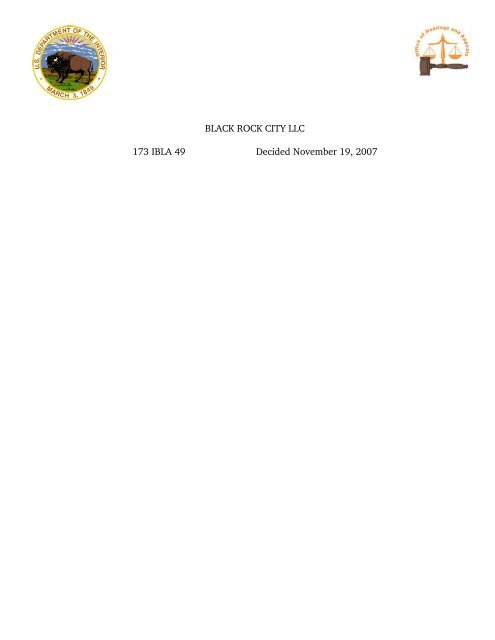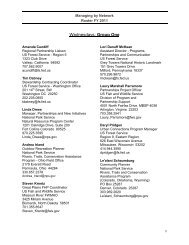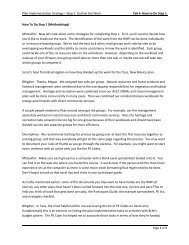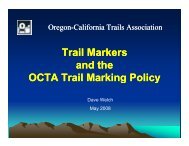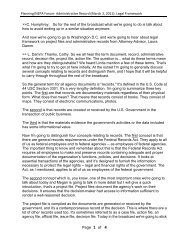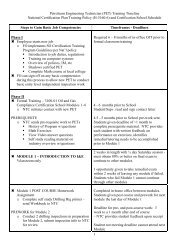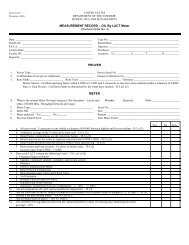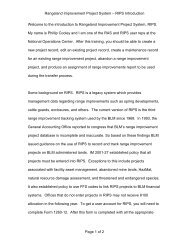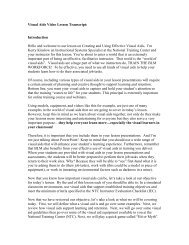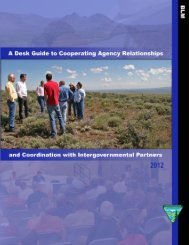173 IBLA 049 Black Rock City LLC - About the Office of Hearings ...
173 IBLA 049 Black Rock City LLC - About the Office of Hearings ...
173 IBLA 049 Black Rock City LLC - About the Office of Hearings ...
You also want an ePaper? Increase the reach of your titles
YUMPU automatically turns print PDFs into web optimized ePapers that Google loves.
<strong>IBLA</strong> 2006-230complaining that BRC has argued that BLM has “been inefficient in controlling locallaw enforcement costs for <strong>the</strong> Burning Man event.” In a Memorandum datedApril 12, 2006, <strong>the</strong> Regional Solicitor, Pacific Southwest Region, found legal supportfor <strong>the</strong> stipulation and noted that “if BRC is required to directly pay for local lawenforcement coverage, <strong>the</strong>n BRC will be able to monitor and control such costs byworking directly with local law enforcement <strong>of</strong>ficials.” Apr. 12, 2006, RegionalSolicitor’s Memorandum at 1. 4ANALYSISOur holding is quite narrow and so we begin by explaining what we do notdecide. Our ruling is dependent on no particular factual finding regarding ei<strong>the</strong>r <strong>the</strong>general law-abiding nature <strong>of</strong> <strong>the</strong> festival participants or <strong>the</strong> justification for BLM’srising law enforcement costs. Both positions are warranted. BRC documents <strong>the</strong> lownumber <strong>of</strong> drug arrest incidents at <strong>the</strong> Burning Man festival by contrast with <strong>the</strong>same factor at rock concerts and motorcycle ga<strong>the</strong>rings in or near American cities.Harrison Report at 7. BLM documents <strong>the</strong> increased risk and liability that <strong>the</strong>Burning Man festival poses for all law enforcement agencies associated with it, and<strong>the</strong> related increase in costs and manpower needs. See also Coalition for <strong>the</strong> High<strong>Rock</strong>/<strong>Black</strong> <strong>Rock</strong> Emigrant Trail National Conservation Area, 147 <strong>IBLA</strong> 92, 199 (1998)(demand by appellants that BLM guarantee “sufficient law enforcement staffing” forBurning Man events).Likewise, we do not analyze BLM’s contentions, Answer at 4-10, that <strong>the</strong>FLREA’s fee provisions authorize BLM to collect, in total, an amount in fees whichexceeds <strong>the</strong> Government’s costs <strong>of</strong> administering <strong>the</strong> permit. BRC does not challenge<strong>the</strong> fixed-rate SRP fee for <strong>the</strong> 2006-2010 permits, nor is it seeking a refund <strong>of</strong>amounts paid in excess <strong>of</strong> Government expenses.BRC’s appeal is limited to a challenge to BLM’s authority to require, inaddition to <strong>the</strong> fixed-rate fee for <strong>the</strong> event, which it does not contest, what BRCclaims is a cost recovery fee for <strong>the</strong> same event. BRC’s discussion <strong>of</strong> <strong>the</strong> relationshipbetween event costs and fee collection comes from its contention that <strong>the</strong> FLREAgenerally requires fees to be associated with actual Government costs and that BLM’simposing a burden to reimburse over $66,000 in law enforcement costs that <strong>the</strong>Department is authorized by law to make to <strong>the</strong> County, in addition to <strong>the</strong> fixed-ratepppd fee, reduces <strong>the</strong> association between <strong>the</strong> fixed-rate fee and <strong>the</strong> Government’sexpenses for <strong>the</strong> Burning Man event. Whatever BRC’s opinions about <strong>the</strong> fix-rate feerelative to <strong>the</strong> Government’s actual costs, our understanding <strong>of</strong> its appeal is that itchallenges________________________4 Considering BLM’s contentions regarding <strong>the</strong> inevitability <strong>of</strong> cost hikes due toliability and <strong>the</strong> sheer size <strong>of</strong> <strong>the</strong> <strong>Black</strong> <strong>Rock</strong> <strong>City</strong> population, it is unclear whe<strong>the</strong>rany expectation that BRC can reduce costs is realistic.<strong>173</strong> <strong>IBLA</strong> 56
<strong>IBLA</strong> 2006-230BLM’s authority to impose a second fee. Even if we find that <strong>the</strong> Government hassuch authority, <strong>the</strong> ultimate effect <strong>of</strong> a second fee on <strong>the</strong> percentage <strong>of</strong> <strong>the</strong> SRP fixedratefees collected that constitutes “net proceeds” is not before us.BRC argues that both <strong>the</strong> FLREA and FLPMA deny BLM authority to impose asecond fee. BRC contends that FLPMA’s authorization for BLM to permit Countyinvolvement in law enforcement for events on public lands and to reimburse <strong>the</strong>County for its costs is evidence that Congress anticipated that State and local lawenforcement costs are an expense <strong>of</strong> <strong>the</strong> Federal Government. BRC argues that actualcosts <strong>of</strong> <strong>the</strong> Government in administering an SRP are chargeable to <strong>the</strong> permittee, butthat such reimbursement derives from ei<strong>the</strong>r a fixed-rate SRP fee or a cost recoveryfee, but not both. BRC claims that BLM may not evade FLPMA and <strong>the</strong> FLREA, byimposing <strong>the</strong> burden <strong>of</strong> State and local law enforcement on a private entity.BLM reads its regulations to permit BLM to charge <strong>the</strong> fixed-rate pppd fee, andalso to require BRC to bear responsibility for reimbursing <strong>the</strong> County for State andlocal law enforcement costs. BLM denies, however, that <strong>the</strong> stipulation is or imposesa fee and explains that it has “chosen not to pursue cost recovery.” Answer at 11.BLM contends instead that stipulation 16 is consistent with <strong>the</strong> FLREA andDepartmental SRP regulations, which permit BLM to impose stipulations at itsdiscretion. BLM claims that FLPMA authorizes BLM to ensure reimbursement <strong>of</strong> <strong>the</strong>County’s costs <strong>of</strong> law enforcement for events held on public lands and that BLM hasmerely ensured that reimbursement will be made by BRC instead <strong>of</strong> by <strong>the</strong>Government.I. The FLREADiscussion <strong>of</strong> <strong>the</strong> current authority governing SRP fees requires addressing <strong>the</strong>FLREA, and a digression into applicable law prior to <strong>the</strong> enactment <strong>of</strong> that legislationin 2004. Sections 303(a) and 310 <strong>of</strong> FLPMA authorize <strong>the</strong> Secretary to promulgateregulations to carry out <strong>the</strong> purposes <strong>of</strong> FLPMA, including <strong>the</strong> management, use andprotection <strong>of</strong> <strong>the</strong> public lands. 43 U.S.C. §§ <strong>173</strong>3(a) and 1740 (2000). Section 4(d)<strong>of</strong> <strong>the</strong> Land and Water Conservation Fund Act <strong>of</strong> 1965 (LWCFA),16 U.S.C. § 460l-6a (2000), as amended by section 315 <strong>of</strong> <strong>the</strong> Department <strong>of</strong> <strong>the</strong>Interior and Related Agencies Appropriations Act <strong>of</strong> 1996, Pub. L. No. 104-134,authorized <strong>the</strong> Secretary to collect fees for recreational use <strong>of</strong> <strong>the</strong> public lands and toissue SRPs for group activities and recreation events on those lands. The fees were tobe “fair and equitable, taking into consideration <strong>the</strong> direct and indirect costs to <strong>the</strong>Government, <strong>the</strong> benefits to <strong>the</strong> recipient, <strong>the</strong> public policy or interest served, <strong>the</strong>comparable recreation fees charged by non-Federal public agencies, <strong>the</strong> economic<strong>173</strong> <strong>IBLA</strong> 57
<strong>IBLA</strong> 2006-230and administrative feasibility <strong>of</strong> fee collection and o<strong>the</strong>r pertinent factors.” 16 U.S.C.§ 460l-6a(d) (2000). 5In 1978, <strong>the</strong> Department updated pre-existing rules governing SRPs at43 C.F.R. Subpart 8372, 43 Fed. Reg. 40734 (Sept. 12, 1978). In 1984, it amended<strong>the</strong> fee provisions for SRPs to ensure that BLM could collect fees to cover its “directand indirect costs” associated with such permits. 49 Fed. Reg. 34332, 34337(Aug. 29, 1984). In 2002, <strong>the</strong> Department revised its regulations at 43 C.F.R.Subpart 8372 (2000), replacing <strong>the</strong>m with new regulations governing SRPs at43 C.F.R. Part 2930. The regulations were recast in “plain English” and “update[d]”to reflect “changes over <strong>the</strong> last 15 years in recreational activities and large-scaleevents.” 67 Fed. Reg. 6<strong>173</strong>2, 61740 (Oct. 1, 2002). This rulemaking waspromulgated under <strong>the</strong> authority <strong>of</strong> <strong>the</strong> LWCFA, 16 U.S.C. § 460l-6a (2000), andsection 310 <strong>of</strong> FLPMA, 43 U.S.C. § 1740 (2000). Subpart 2932 addresses, inter alia,SRPs for organized events.In December 2004, Congress enacted new legislation authorizing <strong>the</strong> issuance<strong>of</strong> SRPs and <strong>the</strong> collection <strong>of</strong> recreation fees. The FLREA repealed <strong>the</strong> relevantprovisions <strong>of</strong> <strong>the</strong> LWCFA, 16 U.S.C. § 6812(a) (Supp. V 2005), subject to agrandfa<strong>the</strong>r provision for existing permits, id. at § 6804(f)(2). The Departmentalrules covering SRPs at 43 C.F.R. Subpart 2932 thus predate enactment <strong>of</strong> <strong>the</strong> currentstatutory authority for <strong>the</strong>m. The Department issued proposed rules in 2005 tomodify <strong>the</strong> regulations to comport with <strong>the</strong> FLREA in ways not relevant here, 70 Fed.Reg. 70570 (Nov. 22, 2005), finalizing <strong>the</strong> changes in 2007. 72 Fed. Reg. 7832,7836 (Feb. 21, 2007) (changes to 43 C.F.R. § 2932.57).[1] The FLREA authorizes <strong>the</strong> Secretary to “issue a special recreation permit,and charge a special recreation permit fee in connection with <strong>the</strong> issuance <strong>of</strong> <strong>the</strong>permit, for specialized recreation uses <strong>of</strong> Federal recreational lands and waters, suchas group activities, recreation events, [and] motorized recreational vehicle use.”16 U.S.C. § 6802(h) (Supp. V 2005). The FLREA addresses six criteria with whichrecreation fees, including special recreation permit fees, see 16 U.S.C. § 6801(8)(definition <strong>of</strong> recreation fee) and (13) (definition <strong>of</strong> SRP fee), shall be consistent:(1) The amount <strong>of</strong> <strong>the</strong> recreation fee shall be commensurate with <strong>the</strong>benefits and services provided to <strong>the</strong> visitor.________________________5 Section 6.a(2)(a) <strong>of</strong> OMB Circular A-25, released July 8, 1993, ensured that “usercharges will be sufficient to recover <strong>the</strong> full cost to <strong>the</strong> Federal Government (asdefined in Section 6d) . . . .” Section 6.d(1) defines “full cost” as “all direct andindirect costs to any part <strong>of</strong> <strong>the</strong> Federal Government” and sections 6.d(1)(a) and (d)ensure that such costs include direct and indirect personnel costs and <strong>the</strong> costs <strong>of</strong>enforcement.<strong>173</strong> <strong>IBLA</strong> 58
(2) The Secretary shall consider <strong>the</strong> aggregate effect <strong>of</strong> recreationfees on recreation users and recreation service providers.(3) The Secretary shall consider comparable fees charged elsewhereand by o<strong>the</strong>r public agencies and nearby private sector operators.(4) The Secretary shall consider <strong>the</strong> public policy or managementobjectives served by <strong>the</strong> recreation fee.(5) The Secretary shall obtain input from <strong>the</strong> appropriate RecreationResource Advisory Committee . . . .(6) The Secretary shall consider such o<strong>the</strong>r factors or criteria asdetermined appropriate by <strong>the</strong> Secretary.<strong>IBLA</strong> 2006-23016 U.S.C. § 6802(b) (Supp. V 2005). Though <strong>the</strong> parties debate <strong>the</strong> meaning <strong>of</strong> <strong>the</strong>first <strong>of</strong> <strong>the</strong>se criteria, <strong>the</strong>y both agree that it maintains <strong>the</strong> authority to consider <strong>the</strong>value <strong>of</strong> <strong>the</strong> services provided to <strong>the</strong> permittee, consistent with <strong>the</strong> LWCFA’sauthorization to consider <strong>the</strong> Government’s expenses, as part <strong>of</strong> <strong>the</strong> SRP fee. See alsoOMB Circular A-25. We need not decide how much relevance this factor must havefor <strong>the</strong> fee, because both <strong>the</strong> FLREA and BLM regulations govern <strong>the</strong> more pertinentquestion <strong>of</strong> whe<strong>the</strong>r two separate fees may be charged. Both authorities prohibit this.The FLREA is <strong>the</strong> “sole recreation fee authority.” 16 U.S.C. § 6813(d) (Supp.V 2005). “Recreation fees charged under this chapter shall be in lieu <strong>of</strong> fees chargedfor <strong>the</strong> same purposes under any o<strong>the</strong>r provision <strong>of</strong> law.” Id. While <strong>the</strong> FLREAcontains a number <strong>of</strong> provisions governing different types <strong>of</strong> fees and fee areas, and<strong>the</strong> proper use <strong>of</strong> collected monies, nothing in <strong>the</strong> FLREA authorizes <strong>the</strong> Secretary toimpose fees o<strong>the</strong>r than recreation fees, nor does it specify SRP terms. Accordingly,<strong>the</strong> FLREA is not a direct source <strong>of</strong> authority for imposing stipulation 16 as acondition <strong>of</strong> <strong>the</strong> permit. 6________________________6 BLM asserts that stipulation 16 requiring “BRC [to] itself ensure adequate local lawenforcement through an agreement with” <strong>the</strong> County is consistent with <strong>the</strong> FLREA.Answer at 11. BLM cites 16 U.S.C. § 6805 (Supp. V 2005), which is an FLREAprovision authorizing <strong>the</strong> Secretary to enter into cooperative agreements andcontracts with governmental and nongovernmental entities. Answer at 13. Thisprovision, however, only authorizes <strong>the</strong> Secretary to contract with a “governmentalentity . . . to obtain law enforcement services.” Nothing in this statutory provisionrelates to SRP conditions BLM may impose on permit holders to provide for lawenforcement.<strong>173</strong> <strong>IBLA</strong> 59
<strong>IBLA</strong> 2006-230None <strong>of</strong> <strong>the</strong> above provisions, however, permits a Field <strong>Office</strong> to “adjust” <strong>the</strong>fixed-rate fee by imposing a second and separate fee on a permittee. 8 The regulationat subsection (e) provides <strong>the</strong> only authority for BLM to charge a fee based on costrecovery instead <strong>of</strong> <strong>the</strong> standard fee, permitting BLM to impose (1) additional costrecovery for “commercial” use permits for “recovery <strong>of</strong> processing costs,” and (2)alternative cost recovery for organized competitive or organized group event permits.43 C.F.R. § 2932.31(e). BLM may choose <strong>the</strong> alternative <strong>of</strong> a cost recovery basis feefor a group event SRP in <strong>the</strong> following circumstance:(2) Competitive or organized group/event use. BLM may charge a feefor recovery <strong>of</strong> costs to <strong>the</strong> agency <strong>of</strong> analyses and permit processinginstead <strong>of</strong> <strong>the</strong> [SRP] fee, if--(i) BLM needs more than 50 hours <strong>of</strong> staff time to process [anSRP] for competitive or organized group/event use in any one year, and(ii) We anticipate that permit fees on <strong>the</strong> fee schedule for thatyear will be less than <strong>the</strong> costs <strong>of</strong> processing <strong>the</strong> permit.________________________7 (...continued)Director in <strong>the</strong> form <strong>of</strong> a minimum fee ($4.00 [pppd] in 2002). State Directors mayestablish a higher fee when warranted by circumstances.” H-2930-1, Oct. 7, 2003,Chap. 1, III.G.d. Notably, BLM updated this portion <strong>of</strong> <strong>the</strong> BLM Manual 2 monthsafter <strong>the</strong> decision at issue here, in part to address relevant provisions <strong>of</strong> <strong>the</strong> FLREA.BLM Handbook H-2930-1, Aug. 7, 2006. This version <strong>of</strong> <strong>the</strong> manual is not applicablehere, nor can it amend duly promulgated rules <strong>of</strong> <strong>the</strong> Department; none<strong>the</strong>less, itsissuance has relevance to BLM’s interpretation <strong>of</strong> <strong>the</strong> FLREA.8 BLM contends that <strong>the</strong> standard fee assessments are so low that <strong>the</strong>y have no effecton recreation users’ decisions to use <strong>the</strong> public lands. Answer at 8, citing FLREAHouse Report No. 108-790; see also 16 U.S.C. § 6802(b)(2). BLM documents that <strong>the</strong>standard fee <strong>of</strong> $4 is “minuscule” in comparison with recreation industry revenues.Answer at 9; see also 16 U.S.C. § 6802(b)(3). If BLM believes, as it suggests in itsAnswer, that <strong>the</strong> FLREA envisions that <strong>the</strong> Department’s standard fee should moreclosely approximate market rate revenues realized by <strong>the</strong> recreation industry, <strong>the</strong>Director’s prerogative is to adjust minimum fees by publication in <strong>the</strong> Federal Register,or to encourage <strong>the</strong> State Director to adjust event-specific fees with appropriatepublic notice. 43 C.F.R. § 2932.31(b)-(d). This apparently has not happened, and<strong>the</strong>refore <strong>the</strong> propriety <strong>of</strong> BLM’s doing so under its own rules or <strong>the</strong> FLREA is notbefore us. But see H-2930-1, Aug. 7, 2006, Chap. 2 (addressing FLREA terms incontext <strong>of</strong> special use permits, as opposed to special recreation permits (Chap. 1)).<strong>173</strong> <strong>IBLA</strong> 61
<strong>IBLA</strong> 2006-23043 C.F.R. § 2932.31(e) (emphasis in text added). Thus, Departmental rules provideBLM no authority to supplement <strong>the</strong> fixed-rate minimum permit fee on an eventspecificbasis with a fee based on <strong>the</strong> Government’s cost recovery. Ra<strong>the</strong>r, an SRP feebased on cost recovery is “instead <strong>of</strong>” <strong>the</strong> fixed-rate fee, and may be utilized by BLMonly under <strong>the</strong> circumstances set forth in 43 C.F.R. § 2932.31(e)(2).Accordingly, under both applicable statutory and regulatory authoritygoverning SRP fees, BLM is obligated to impose fees for SRPs. The authority found in<strong>the</strong> FLREA for recreation fees is exclusive and supplants any o<strong>the</strong>r authority in law.For an SRP for a group event, such as <strong>the</strong> Burning Man festival, BLM may ei<strong>the</strong>rcharge <strong>the</strong> fixed-rate minimum fee under 43 C.F.R. § 2932.31(a) (which may beadjusted by <strong>the</strong> Director under § 2932.31(b) and (c), or <strong>the</strong> State Director under§ 2932.31(d)) or a cost recovery fee under 43 C.F.R. § 2932.31(e), but not both.Therefore, to <strong>the</strong> extent Stipulation 16 is a separate cost recovery fee additional to<strong>the</strong> $4 pppd minimum fee established by <strong>the</strong> Director and adopted in its permit, it isnot allowed by statute or rule. 9As noted above, however, BLM denies that <strong>the</strong> stipulation is a cost recoveryfee. Ra<strong>the</strong>r, BLM asserts that authority for <strong>the</strong> stipulation is found in that portion <strong>of</strong><strong>the</strong> SRP rules providing BLM authority to make stipulated terms a condition <strong>of</strong> <strong>the</strong>granting <strong>of</strong> SRPs, 43 C.F.R. § 2932.41. Answer at 12. This rule states: “Whatstipulations must I follow? You must follow all stipulations in your approved [SRP].BLM may impose stipulations and conditions to meet management goals andobjectives and to protect lands and resources and <strong>the</strong> public interest.” BLM thusrelies on this rule as authority to require, by stipulation, that BRC absorb additionalcosts over and above <strong>the</strong> minimum published fee.BLM is correct in large part. BLM has wide discretion to impose permitstipulations, even ones that might ultimately compel a permittee to contract withano<strong>the</strong>r party for services, and we accept that stipulated permit terms might have <strong>the</strong>consequence <strong>of</strong> imposing a financial burden on <strong>the</strong> permittee. For example, BLM isrequired by section 302(b) <strong>of</strong> FLPMA to prevent unnecessary or undue degradation <strong>of</strong><strong>the</strong> public lands. 43 U.S.C. § <strong>173</strong>2(b) (2000). The record documents a recurrentissue <strong>of</strong> oil leaks from <strong>the</strong> many cars visiting <strong>the</strong> festival site. BLM reasonably may________________________9 Notably, 43 C.F.R. § 2932.31(e)(2)(ii) permits cost recovery only if BLManticipates <strong>the</strong> “permit fees on <strong>the</strong> fee schedule for that year [to] be less than <strong>the</strong>costs <strong>of</strong> processing <strong>the</strong> permit.” BLM’s admission that only 78 percent <strong>of</strong> <strong>the</strong> feescollected from <strong>the</strong> Burning Man event in 2004 and 2005 covered its costs, and that itused 22 percent <strong>of</strong> <strong>the</strong> fees collected for o<strong>the</strong>r uses within <strong>the</strong> NCA, would lead to <strong>the</strong>conclusion that, without more information for 2006, imposing a cost recovery feewould not have been permissible.<strong>173</strong> <strong>IBLA</strong> 62
<strong>IBLA</strong> 2006-230impose a stipulation for clean up. Such a stipulation could easily compel BRC tocontract with a petroleum product clean-up crew, and to pay for its services.On <strong>the</strong> o<strong>the</strong>r hand, in reviewing <strong>the</strong> rule and its regulatory history, it seemsclear to us that 43 C.F.R. § 2932.41 was never intended to allow BLM to add astipulation for a cost recovery fee. Ra<strong>the</strong>r, all recovery <strong>of</strong> <strong>the</strong> United States’ directand indirect costs was intended to be addressed in <strong>the</strong> fee provision.The 2002 rulemaking establishing 43 C.F.R. § 2932.41 explained that it was arevision and recodification <strong>of</strong> a rule in place since 1978. In publishing <strong>the</strong> proposedrule in 2000, <strong>the</strong> Department discussed <strong>the</strong> rule related to stipulations, proposed atsections 2932.41-.44, and explained: “Permit Stipulations and Terms[.] The nextseveral sections deal with permit terms, insurance requirements and bondingrequirements. These sections are all based on paragraphs in existing section 8372.5,and do not contain substantive changes.” 65 Fed. Reg. 31234, 31237 (May 16,2000). The final 2002 rulemaking adopted <strong>the</strong> same version <strong>of</strong> section 2932.41,without fur<strong>the</strong>r discussion. 67 Fed. Reg. 6<strong>173</strong>2 (Oct. 1, 2002).The pre-existing rule addressing stipulations, 43 C.F.R. § 8372.5, appeared in1978. Until it was revised and recodified in 2002, that rule stated: “Stipulations: Aspecial recreation permit will contain such stipulations as <strong>the</strong> authorized <strong>of</strong>ficerconsiders necessary to protect <strong>the</strong> lands and resources involved and <strong>the</strong> publicinterest in general.” 43 Fed. Reg. 40740 (Sept. 12, 1978); 43 C.F.R. § 8372.5(b)(2001). That nei<strong>the</strong>r this rule nor <strong>the</strong> one promulgated in 2002 had anything to dowith recovery <strong>of</strong> <strong>the</strong> United States’ expenses is shown from a side-by-side history <strong>of</strong><strong>the</strong> fee regulation.The Department established SRP fees in 1978 at 43 C.F.R. § 8372.4 (1979).This fee provision set fees ranging from $1 to $25, with refunds authorized for nonuse.Id.; 43 Fed. Reg. 40740 (Sept. 12, 1978). This changed in 1984, when <strong>the</strong>Department established <strong>the</strong> first fee schedule and fees based on cost recovery in <strong>the</strong>rule that remained in place until 2002. Notably, while <strong>the</strong> 1984 rulemakingamended <strong>the</strong> fee regulation at 43 C.F.R. § 8372.4, it did not change <strong>the</strong> stipulationrule in place since 1978 at 43 C.F.R. § 8372.5.A look at this 1984 rulemaking makes clear that <strong>the</strong> Department meant toaddress all <strong>of</strong> <strong>the</strong> Government’s cost recovery in <strong>the</strong> fees established in 43 C.F.R.§ 8372.4. Subsection (a) established a set fee schedule to be phased in over a 3-yearperiod, and published in <strong>the</strong> Federal Register <strong>the</strong>reafter as “adjusted from time to timeto reflect changes in costs.” 43 C.F.R. § 8372.4(a) (2001); 49 Fed. Reg. 34334(Aug. 29, 1984) (phased-in fee schedule published). The Department explained that<strong>the</strong> factors to be considered in <strong>the</strong> fee schedule rate derived from <strong>the</strong> LWCFA, which“requires consideration to be given to . . . direct and indirect costs to <strong>the</strong> Government<strong>173</strong> <strong>IBLA</strong> 63
<strong>IBLA</strong> 2006-230. . . .” 49 Fed. Reg. 34332. Rejecting commenters’ suggestions that fees should bebased on <strong>the</strong> amount <strong>of</strong> environmental degradation caused by permittees, <strong>the</strong>rulemaking explained that environmental degradation was not a consideration for <strong>the</strong>fee recovery established in <strong>the</strong> LWCFA, but was instead considered through meanssuch as <strong>the</strong> Department’s general authority to impose stipulations. Specifically, <strong>the</strong>rulemaking explained that environmental effects are to be considered in <strong>the</strong> context<strong>of</strong> <strong>the</strong> National Environmental Policy Act <strong>of</strong> 1969, 42 U.S.C. § 4321-4370. To <strong>the</strong>extent impacts are discovered in that process, “as required in 43 CFR 8372.5(b),stipulations to mitigate adverse impact are made part <strong>of</strong> <strong>the</strong> terms and conditions <strong>of</strong><strong>the</strong> permit, if it is issued.” 49 Fed. Reg. 34332.The 1984 fee regulations also permitted BLM to charge fees based on actualcosts, in lieu <strong>of</strong> <strong>the</strong> fee schedule. “Actual costs to <strong>the</strong> United States shall be in lieu <strong>of</strong><strong>the</strong> fees provided in <strong>the</strong> schedule when <strong>the</strong> estimated cost <strong>of</strong> issuing and monitoring<strong>the</strong> permit . . . exceeds $5,000, except when <strong>the</strong> total estimated fees from <strong>the</strong>schedule over <strong>the</strong> term <strong>of</strong> <strong>the</strong> permit exceed <strong>the</strong> estimated actual cost.” 43 C.F.R.§ 8372.4(a)(2) (2001). But <strong>the</strong> rulemaking prohibited BLM from unilaterally raisingfees above <strong>the</strong> schedule rate if <strong>the</strong> schedule was used. As proposed, subsection (a)(2)allowed BLM to charge fees higher than <strong>the</strong> fee schedule in particular circumstances.In response to public comment, however, this provision was deleted. Commenters“feared <strong>the</strong> authorized <strong>of</strong>ficer could indiscriminately raise fees. This provision hasbeen removed in <strong>the</strong> final rulemaking.” 49 Fed. Reg. 34336 (Aug. 29, 1984).When <strong>the</strong> Department revised and recodified <strong>the</strong> rule in 2002, it maintained<strong>the</strong> fee schedule for commercial, competitive and group permits, but proposed toallow BLM to also charge a cost recovery fee “in addition to those set by <strong>the</strong>schedule” for “recovery <strong>of</strong> our administrative costs” when more than 50 hours wasrequired for BLM to process a permit. This appeared in <strong>the</strong> proposed rule at43 C.F.R. § 2932.31(d). 65 Fed. Reg. 31242 (May 16, 2000). BLM receivedconsiderable public comment on this proposal, <strong>the</strong> majority from Burning Manfestival participants. 67 Fed. Reg. 6<strong>173</strong>4 (Oct. 1, 2002). “Nearly all <strong>the</strong> commentsopposed imposition <strong>of</strong> both cost recovery and use fees for <strong>the</strong> same permit.” Id.Proceeding to consider various authorities, <strong>the</strong> Department issued <strong>the</strong> final ruledescribed above, allowing an additional cost recovery element for commercialpermits, but only alternative cost recovery in lieu <strong>of</strong> schedule fees for group eventsunder <strong>the</strong> conditions established in 43 C.F.R. § 2932.31(e)(2). In response tocomments, <strong>the</strong> rulemaking stated:[W]e have made several changes in paragraph (e) [proposed as (d)].These changes should have <strong>the</strong> effect <strong>of</strong> clarifying when cost recoverycharges apply and when permit fees apply to commercial, competitive,and organized group activities or events. We separated cost recovery<strong>173</strong> <strong>IBLA</strong> 64
equirements for commercial use from competitive or organizedgroup/event use. . . .. . .<strong>IBLA</strong> 2006-230• In cases where we charge for cost recovery for recreational events(as opposed to commercial use), <strong>the</strong> final rule provides that <strong>the</strong> chargeswill be in place <strong>of</strong> permit fees.• In some cases where we would normally charge for cost recovery,we may elect to charge a permit fee instead <strong>of</strong> cost recovery if <strong>the</strong>permit fee is greater than cost recovery would be.67 Fed. Reg. 6<strong>173</strong>5 (Oct. 1, 2002). 10[3] Considering this history, several things are clear. The stipulationregulation at 43 C.F.R. § 2932.41 is not, and never was intended to be, a ruleallowing <strong>the</strong> imposition <strong>of</strong> fees for <strong>the</strong> Government’s actual direct or indirect costs.Such costs were to be covered by fees, on ei<strong>the</strong>r a cost recovery or set minimum feebasis. The rule now in place at 43 C.F.R. § 2932.31 covers SRP fees, as did itspredecessor at 43 C.F.R. § 8372.4 (2001). The stipulation rule cannot be construedto allow BLM to transfer to a permit holder Government costs that are also coveredby fees. Ra<strong>the</strong>r, in promulgating <strong>the</strong> fee rules, <strong>the</strong> Department anticipated that <strong>the</strong>United States’ actual direct or indirect costs for group event permits would berecovered with <strong>the</strong> fees charged under <strong>the</strong> fee regulations, and that <strong>the</strong> fee schedulewould be adequate to cover such costs. In <strong>the</strong> case where <strong>the</strong> Government’s actualdirect and indirect costs were not covered (and BLM required more than 50 hours toprocess <strong>the</strong> permit), BLM could alternatively choose a cost recovery fee. Thus, whileBLM most certainly may impose stipulations on <strong>the</strong> approval <strong>of</strong> an SRP, this rule doesnot go so far as to permit BLM to impose a fee that it could not impose under <strong>the</strong> SRPfee rule at 43 C.F.R. § 2932.31.________________________10 It is worth pointing out that <strong>the</strong> BLM Manual as revised on Aug. 7, 2006, statesthat “[f]ees are charged on a per person bas[is] ($4.00/person/day in 2005).Permittees will pay <strong>the</strong> minimum fee plus any fees due in excess <strong>of</strong> <strong>the</strong> minimum fee.State Directors may establish a higher fee when warranted” based on enumeratedfactors. H-2930-1, Aug. 7, 2006, Chap. 1, III.G.2.d, at 26. As terms <strong>of</strong> <strong>the</strong> BLMManual may not amend existing regulations, we do not construe <strong>the</strong> full sentencequoted to change <strong>the</strong> terms <strong>of</strong> 43 C.F.R. § 2932.31, as promulgated, and presumethat <strong>the</strong> “fees in excess <strong>of</strong> <strong>the</strong> minimum fee” refer to higher fees established by <strong>the</strong>State Director, as addressed in <strong>the</strong> next sentence <strong>of</strong> <strong>the</strong> Manual and 43 C.F.R.§ 2932.31(d).<strong>173</strong> <strong>IBLA</strong> 65
<strong>IBLA</strong> 2006-230What has not yet been answered by our discussion is whe<strong>the</strong>r stipulation 16imposes a fee or not within <strong>the</strong> meaning <strong>of</strong> 43 C.F.R. Subpart 2932. On <strong>the</strong> face <strong>of</strong> it,<strong>the</strong> transfer <strong>of</strong> money is not mentioned in <strong>the</strong> stipulation. Ra<strong>the</strong>r, <strong>the</strong> stipulationdirects BRC to ensure State and local law enforcement on <strong>the</strong> public lands during <strong>the</strong>festival. 11 Our analysis thus arrives at <strong>the</strong> following question: When an SRP holderis paying <strong>the</strong> fixed minimum fee addressed at 43 C.F.R. § 2932.31(c), does 43 C.F.R.§ 2932.41 authorize BLM to add a stipulation requiring <strong>the</strong> permittee to contract forand pay <strong>the</strong> costs <strong>of</strong> providing State and local law enforcement on <strong>the</strong> public landsthat previously were treated by BLM as part <strong>of</strong> <strong>the</strong> Government’s direct or indirectcosts recovered by fees collected as established in <strong>the</strong> minimum fee schedule?Answering <strong>the</strong> question requires advertence to FLPMA.II.FLPMABLM’s position on whe<strong>the</strong>r FLPMA provides authority for stipulation 16 is notentirely clear. In response to BRC’s challenge that FLPMA is not a source <strong>of</strong> authorityfor <strong>the</strong> stipulation, BLM cites FLPMA section 303, 43 U.S.C. § <strong>173</strong>3 (2000). Answerat 12-13. Whe<strong>the</strong>r BLM believes that this statutory provision gives it direct authorityfor <strong>the</strong> stipulation is never clearly articulated. In any event, <strong>the</strong> relevance <strong>of</strong> thisprovision <strong>of</strong> FLPMA is that, given <strong>the</strong> responsibility <strong>of</strong> <strong>the</strong> Secretary <strong>of</strong> <strong>the</strong> Interior forlaw enforcement on <strong>the</strong> public lands administered by <strong>the</strong> Department, section 303ensures that <strong>the</strong> Secretary has authority to negotiate with local agencies for <strong>the</strong>irassistance in enforcing Federal laws, and also to enter into cooperative, contractualarrangements with <strong>the</strong>m to enforce State and local laws on <strong>the</strong> public lands <strong>of</strong> <strong>the</strong>United States. “The Secretary is authorized to cooperate” and “[s]uch cooperationmay include reimbursement” to <strong>the</strong> local agency for expenditures incurred by it . . . .”FLPMA section 303 states 12 :____________________________11 BLM goes to some lengths to explain that it has authority and discretion todetermine <strong>the</strong> level <strong>of</strong> law enforcement necessary on <strong>the</strong> public lands. Answer at14-16, citing, inter alia, 43 C.F.R. § <strong>173</strong>3 (2000), and Reed v. U.S. Department <strong>of</strong> <strong>the</strong>Interior, 231 F.3d at 505-06. We do not question this authority. BLM fails to explainhow it can, by stipulation, bestow that discretion on a required private agreementbetween <strong>the</strong> County and <strong>the</strong> permit holder. In <strong>the</strong> current BLM Manual, <strong>the</strong>provision addressing stipulations states that “BLM shall not additionally stipulate oro<strong>the</strong>rwise regulate matters that are <strong>the</strong> responsibility <strong>of</strong> o<strong>the</strong>r Federal, State, or localagencies.” H-2930-1, Aug. 7, 2006, Chap. 1, III.L.2, at 42 (special stipulations). Asthis version <strong>of</strong> <strong>the</strong> Manual did not apply in this case, we need not decipher <strong>the</strong>meaning <strong>of</strong> this provision as it might apply to stipulation 16.12 Subsection (g) is regularly cited as <strong>the</strong> authority for <strong>the</strong> Secretary to hold personsin trespass on <strong>the</strong> public lands. See 43 C.F.R. Part 2920. Subsection (a) is <strong>the</strong>(continued...)<strong>173</strong> <strong>IBLA</strong> 66
(c) Contracts for enforcement <strong>of</strong> Federal laws andregulations by local law enforcement <strong>of</strong>ficials; procedureapplicable; contract requirements and implementation<strong>IBLA</strong> 2006-230(1) When <strong>the</strong> Secretary determines that assistance is necessaryin enforcing Federal laws and regulations relating to <strong>the</strong> public lands or<strong>the</strong>ir resources he shall <strong>of</strong>fer a contract to appropriate local <strong>of</strong>ficialshaving law enforcement authority within <strong>the</strong>ir respective jurisdictionswith <strong>the</strong> view <strong>of</strong> achieving maximum feasible reliance upon local lawenforcement <strong>of</strong>ficials in enforcing such laws and regulations. TheSecretary shall negotiate on reasonable terms with such <strong>of</strong>ficials whohave authority to enter into such contracts to enforce such Federal lawsand regulations. . . .(2) The Secretary may authorize Federal personnel orappropriate local <strong>of</strong>ficials to carry out his law enforcementresponsibilities with respect to <strong>the</strong> public lands and <strong>the</strong>ir resources. . . .(d) Cooperation with regulatory and law enforcement<strong>of</strong>ficials <strong>of</strong> any State or political subdivision in enforcement<strong>of</strong> laws or ordinancesIn connection with <strong>the</strong> administration and regulation <strong>of</strong> <strong>the</strong> useand occupancy <strong>of</strong> <strong>the</strong> public lands, <strong>the</strong> Secretary is authorized tocooperate with <strong>the</strong> regulatory and law enforcement <strong>of</strong>ficials <strong>of</strong> any Stateor political subdivision <strong>the</strong>re<strong>of</strong> in <strong>the</strong> enforcement <strong>of</strong> <strong>the</strong> laws orordinances <strong>of</strong> such State or subdivision. Such cooperation may includereimbursement to a State or its subdivision for expenditures incurred byit in connection with activities which assist in <strong>the</strong> administration andregulation <strong>of</strong> use and occupancy <strong>of</strong> <strong>the</strong> public lands.43 U.S.C. § <strong>173</strong>3 (2000) (emphasis added). Subsection (c) “authorizes <strong>the</strong> Secretaryto contract with local <strong>of</strong>ficials for law enforcement services where <strong>the</strong> Secretaryconsiders that assistance is necessary to enforce federal laws and regulations onpublic lands.” Smyth, Paul “Federal Law Enforcement Authority on Public Lands:Reality or Mirage?” 21 Arizona Law Review at 494. Subsection (d) is a reliefprovision; Congress expected <strong>the</strong> Secretary to construe it broadly to provide financial________________________12 (...continued)provision granting <strong>the</strong> Secretary <strong>the</strong> authority to enforce Federal law on <strong>the</strong> publiclands, and subsection (b) provides authority to impose penalties for violations <strong>of</strong> law<strong>the</strong>re. See generally Smyth, Paul, “Federal Law Enforcement Authority on PublicLands: Reality or Mirage?” 21 Arizona Law Review 485, 490-93 (1979).<strong>173</strong> <strong>IBLA</strong> 67
<strong>IBLA</strong> 2006-230assistance where “<strong>the</strong> existence <strong>of</strong> large areas <strong>of</strong> public lands deprives <strong>the</strong>governmental entity <strong>of</strong> adequate enforcement . . . .” Id. at 496, citing H.R. Rep.No. 1163, 94 th Cong., 2d Sess. 15 (1976).This provision <strong>of</strong> FLPMA does not address BLM’s authority to imposestipulations on SRP holders, impose fees for SRPs, or shift to private parties <strong>the</strong>Secretary’s authority to “cooperate” with local agencies. Nor does it address BLM’sauthority to require SRP holders to reimburse State or local agencies for lawenforcement expenditures incurred for <strong>the</strong>ir events. The language <strong>of</strong> section 303makes clear that it is <strong>the</strong> Secretary’s obligation to ensure Federal law enforcement onpublic lands and <strong>the</strong> Secretary’s authority to cooperate with local agencies for <strong>the</strong>enforcement <strong>of</strong> State and local laws <strong>the</strong>re, and that “such cooperation,” defined toinclude “reimbursement” for local agencies’ costs, is an obligation <strong>of</strong> <strong>the</strong> Secretary.Thus, FLPMA establishes that law enforcement, whe<strong>the</strong>r undertaken by BLM or bylocal agencies by virtue <strong>of</strong> cooperative arrangements between <strong>the</strong> Department andsuch agencies, is an actual cost <strong>of</strong> <strong>the</strong> United States. This is reinforced by <strong>the</strong> FLREAat 16 U.S.C. § 6805(a)(3) and (b) (Supp. V 2005), which sections, like <strong>the</strong>ir FLPMAcounterparts, permit <strong>the</strong> Secretary to enter into agreements with State and localagencies for law enforcement and for reimbursements to those agencies for <strong>the</strong>irexpenditures. 13 BLM effectively concedes this point in discussing <strong>the</strong> necessaryburden that monitoring <strong>the</strong> Burning Man event imposes on it. Answer at 14-16. But<strong>the</strong> authority for BLM to recover those costs from a permittee is found in <strong>the</strong> feeauthority <strong>of</strong> <strong>the</strong> FLREA, and nowhere else.Therefore, we agree with BRC that BLM did not have authority in 43 C.F.R.§ 2932.41 (<strong>the</strong> stipulation rule) to add a stipulation, <strong>the</strong> effect <strong>of</strong> which was to takedirect or indirect costs <strong>of</strong> <strong>the</strong> Federal Government, compensated and covered by <strong>the</strong>fee schedule rate for an SRP, and impose <strong>the</strong>m on <strong>the</strong> permittee. This was not <strong>the</strong>purpose <strong>of</strong> that rule. In promulgating <strong>the</strong> 2002 rules, <strong>the</strong> Department revealed itsintention, for group permits such as BRC’s, to ensure that BLM charges ei<strong>the</strong>r a feebased on <strong>the</strong> minimum fee schedule (or as adjusted by <strong>the</strong> State Director), or a costrecovery fee, but not both. BLM has effectively charged both here. We recognizeBLM’s argument that it is not charging a cost recovery fee, Answer at 11-13, and thatit is requiring BRC to contract with <strong>the</strong> County for services. While this is true, <strong>the</strong>above analysis <strong>of</strong> FLPMA, <strong>the</strong> FLREA, and even BLM’s past practices confirm that <strong>the</strong>central aspect <strong>of</strong> <strong>the</strong> stipulation is to transfer a cost recovery element supplemental to<strong>the</strong> SRP fee charged to BRC. This BLM cannot do.________________________13 It is also reinforced by <strong>the</strong> policy established in <strong>the</strong> 2006 BLM Manual, whichstates that, when BLM collects an SRP fee based on cost recovery, “[l]aw enforcementdirectly related to <strong>the</strong> activity or event” is an appropriate cost. H-2930-1, Aug. 7,2006, at III.H.1.a.2, at 29.<strong>173</strong> <strong>IBLA</strong> 68
<strong>IBLA</strong> 2006-230Nothing in this holding should be read as prohibiting BLM’s exercise <strong>of</strong>discretion to set stipulations, <strong>the</strong> effect <strong>of</strong> which may require a permit holder toundertake actions which impose financial burdens. Where <strong>the</strong> line is drawn betweenour holding here and such permissible stipulations depends on expenses for which<strong>the</strong> Government is responsible. Under section 302(b) <strong>of</strong> FLPMA, 43 U.S.C. § <strong>173</strong>2(b)(2000), BLM is obligated to condition any authorized use <strong>of</strong> <strong>the</strong> public lands onprevention, whe<strong>the</strong>r by a miner or an SRP holder, <strong>of</strong> unnecessary and unduedegradation. If payment is required for clean up necessary to accomplish thatpurpose, so be it. By contrast, section 303 <strong>of</strong> FLPMA, 43 U.S.C. § <strong>173</strong>3 (2000), andsection 806 <strong>of</strong> <strong>the</strong> FLREA, 16 U.S.C. § 6805 (Supp. V 2005), both address <strong>the</strong>Secretary’s authority to enter into cooperative agreements and contracts with State,County, and local agencies for law enforcement “in connection with administrationand regulation <strong>of</strong> <strong>the</strong> use and occupancy <strong>of</strong> <strong>the</strong> public lands.” 43 U.S.C. § <strong>173</strong>3(2000). Both laws authorize <strong>the</strong> Secretary to reimburse <strong>the</strong> local agencies for <strong>the</strong>irexpenses. This reimbursement is plainly a cost <strong>of</strong> <strong>the</strong> Federal Government. It is thusboth a “direct or indirect cost” considered in establishing <strong>the</strong> fee schedule for SRPfees, 43 C.F.R. § 2932.31(b), and also an actual expense collected from a permitteewhen fees are charged on a cost recovery basis, 43 C.F.R. § 2932.31(e). 14 That BLMagreed with this point <strong>of</strong> view is reflected by <strong>the</strong> fact that it routinely paid <strong>the</strong> Countyfor its local law enforcement expenses for some years, and collected sufficient feesfrom BRC to cover those costs, with proceeds left over. When BLM seeks to compelby stipulation a permittee to pay <strong>the</strong> Government’s actual expenses which arerecouped in SRP fees charged under <strong>the</strong> fee schedule, it is engaging in <strong>the</strong> doublecharging it explicitly repudiated in <strong>the</strong> 2002 rulemaking.To <strong>the</strong> extent BLM chooses in a particular case to charge SRP fees based oncost recovery under 43 C.F.R. § 2932.31(e)(2), instead <strong>of</strong> <strong>the</strong> fee schedule undersubsection (c), we need not decide whe<strong>the</strong>r a permittee may agree to a stipulationrequiring it to make direct payment <strong>of</strong> those costs to <strong>the</strong> County. To <strong>the</strong> extent <strong>the</strong>fee holder agreed, as BRC indicated here that it would agree, to make such paymentsdirectly to a third party, however, <strong>the</strong> authority for such a condition would include<strong>the</strong> fee rule at 43 C.F.R. § 2932.31(e).________________________14 As noted, <strong>the</strong> current BLM Manual identifies costs <strong>of</strong> “law enforcement directlyrelated to <strong>the</strong> activity or event” as “an appropriate cost” under cost recoveryprocedures. H-2930-1, Aug. 7, 2006, Chap. 1, III.H.1.a.(2). It does not list it under“o<strong>the</strong>r fees associated with SRPs,” such as application, assigned site, exclusive use,and grazing fees. Id. at Chap. 1, III.G.2.f.<strong>173</strong> <strong>IBLA</strong> 69
<strong>IBLA</strong> 2006-230Therefore, pursuant to <strong>the</strong> authority delegated to <strong>the</strong> Board <strong>of</strong> Land Appealsby <strong>the</strong> Secretary <strong>of</strong> <strong>the</strong> Interior, 43 C.F.R. § 4.1, that part <strong>of</strong> BLM’s decision to award<strong>the</strong> SRP to BRC subject to stipulation 16 is reversed, and stipulation 16 is declaredvoid.I concur:/s/Lisa HemmerAdministrative Judge/s/Christina S. KalavritinosAdministrative Judge<strong>173</strong> <strong>IBLA</strong> 70


